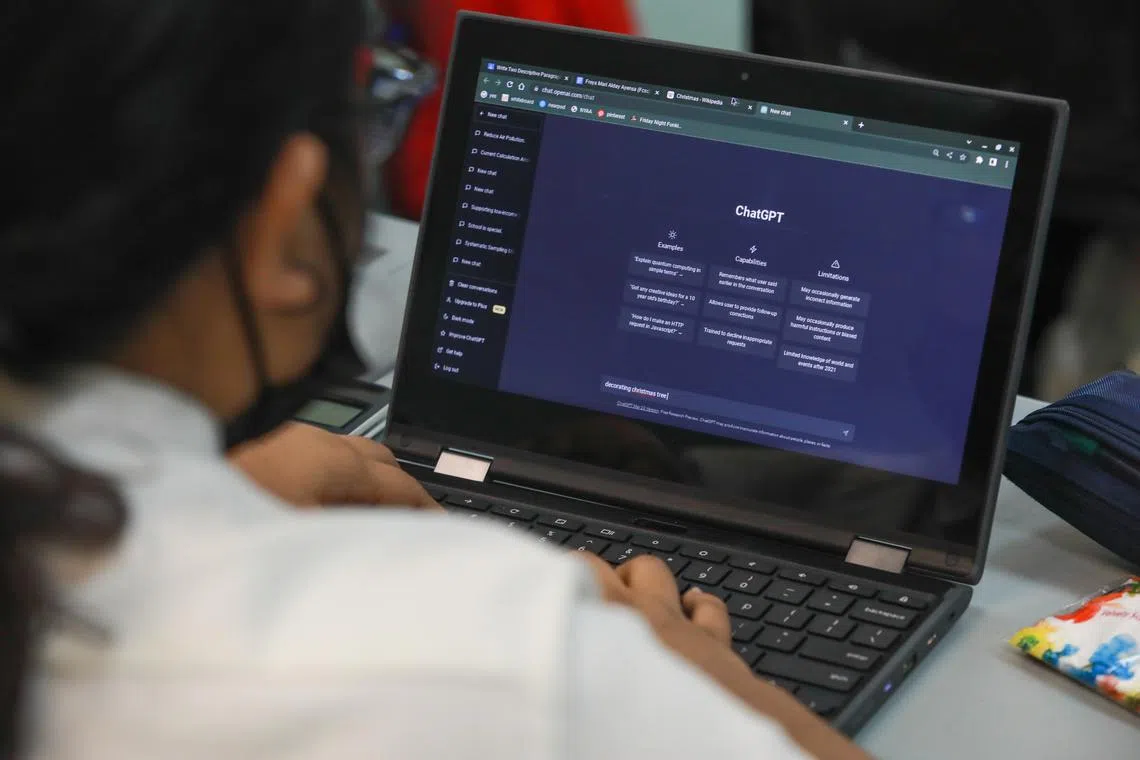Students are taught to use AI ethically and responsibly at different levels: Chan Chun Sing
Sign up now: Get ST's newsletters delivered to your inbox

Primary school pupils may be introduced to AI, while secondary school students may use generative AI to come up with designs in their coursework.
PHOTO: ST FILE
Follow topic:
SINGAPORE - Beyond technical skills, schools equip students to use artificial intelligence (AI) ethically and give them varying levels of exposure according to their age, said Education Minister Chan Chun Sing.
“We will always couple the learning of the technical use of AI with the ethical use of AI,” he said. This includes knowing the benefits as well as the downsides of certain AI products.
Mr Chan said in Parliament on Jan 9 that primary school pupils may be introduced to AI, while secondary school students may use generative AI to come up with designs in their coursework.
Students from institutes of higher learning may learn how AI draws information from various sources, and think about potential biases of the algorithm.
He was responding to five MPs who raised supplementary questions on topics ranging from how AI is being used to prepare students for the workforce and how they are learning to grapple with the risks of fake news, to whether AI-related school work is being graded.
Mr Chan said that while lessons on AI for primary school pupils aimed at providing exposure may not be graded, AI may be used for graded assignments at higher levels, for instance, when used as a tool to aid polytechnic students’ coursework in interior design.
Responding to Dr Tan Wu Meng (Jurong GRC), who asked about the implications of unequal information technology access among students, Mr Chan said the Student Learning Space (SLS) serves as a repository of information beyond what is taught in schools, and is available to all students.
“A Sec 3 student demonstrated to me how he took charge of his own learning during the school holidays by accessing the modules on SLS – these are all free of charge, by the way – to learn at his own pace,” he said.
He also said MOE ensured all students had access to devices such as laptops and bandwidth to learn at home when schools were closed during the Covid-19 pandemic.
Pupils can also use the Adaptive Learning System (ALS) for mathematics, which was launched on SLS in 2023 for three topics covered at the Primary 5 level.
The AI-enabled ALS makes customised learning recommendations for pupils based on how they respond to the questions and activities.
To Nominated MP Ong Hua Han’s question on whether students who take the initiative to complete SLS modules can be recognised, Mr Chan said the ministry will take his suggestion into account. The SLS has modules outside the school curriculum and is meant to encourage students to take charge of their own learning, he added.
Mr Chan said that close to 17,000 students applied to join the AI Student Outreach Programme in 2023. Launched in July 2022, the programme by AI Singapore aims to promote AI literacy and proficiency among students.
He gave a breakdown of the profiles of these students: 11 per cent came from polytechnics, 52 per cent from secondary schools, 11 per cent from Integrated Programme schools, 3 per cent from junior colleges, and 23 per cent from autonomous universities and the Institute of Technical Education.
To guard against the risks of AI, said Mr Chan, students are taught cyber-wellness skills, such as identifying fake news transmitted by AI systems, understanding data security and privacy, and responsible online behaviours. They also learn about ethics, such as the importance of integrity and proper data handling.
Mr Chan also spoke about the importance of mathematics, logical thinking and computational skills as fundamental skills that students need to get into careers that may require AI.
“So we may not teach AI or we may not teach coding specifically, but behind coding, there are certain foundational skills that are very important,” he said.
Mr Chan gave examples of how students are learning about AI:
In Temasek Primary School, pupils learn to use Stable Diffusion, a generative AI image generator, to create an e-book to advocate sustainability. Pupils are taught how to write prompts, evaluate the effectiveness of their prompts and adjust them to improve the quality of their generated images.
At Peirce Secondary School, design and technology teachers guide students to use generative AI tools like ChatGPT and Vizcom to generate ideas for their projects and sketch and visualise solutions for prototypes.
Anderson Serangoon Junior College partnered AI Singapore to organise an event in which students learnt about AI and engaged in a dialogue with industry leaders. The school also developed the ICT Champions Programme to enhance digital literacy and skills among interested students.
Correction note: This story has been edited for clarity.

